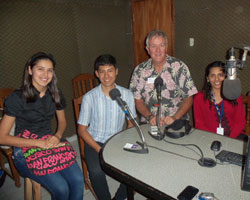Kansas 4-H Partners with Paraguay to Revitalize its Youth Program
Northwest area 4-H specialist Deryl Waldren spent time last month determining needs of the country’s 4-C clubs.
 September 10, 2015
September 10, 2015
Photo and caption available
COLBY, Kan. – All 4-H members in the United States know what the four Hs represent – head, heart, hands and health. Similar youth programs exist across the globe but are known by other names. In Paraguay, the program is called 4-C, with the Cs standing for cabeza, corazón, capacidad and cooperación. These mean head, heart, capacity and cooperation.
“There has been a strong partnership with Paraguay in Kansas through the Partner of the Americas program,” said Deryl Waldren, 4-H specialist for K-State Research and Extension’s northwest area in Colby, Kansas. “Kansas and Paraguay were linked up, because they are similar in that both are relatively flat, have no mountains, have good agricultural land and don’t have access to water.”
Waldren completed a two-week trip to Paraguay in August to perform a needs assessment of its 4-C program. The program was started in 1949, he said, and has gone through many changes over the years. Many in the country want to revitalize the program and make it more accessible and relevant for youth throughout the country.
Waldren started by meeting with stakeholders, including some of the country’s top agricultural leaders, and 4-C clubs to observe and answer questions. Among the top areas in which the 4-C clubs wanted to engage members was service learning projects that benefited local communities, such as community gardens.
“A lot of these gardens that I observed were attached to the schools, and that was helping with food security – making sure families have enough to eat,” Waldren said. “If there’s excess food, they were able to sell it to the community and make money for the school or to do more for 4-C.”
Other service projects of interest to 4-C clubs, he said, depended on a local need. One club did some landscaping and beautified a local park to make it a place where kids would want to go. Another club plans to build an athletic field. Another built fishing ponds that will be stocked to grow fish to sell to members of the community. This project also teaches entrepreneurial skills to members.
“We like to see kids learning that they need to give back to the community in community service projects,” Waldren said. “The best way is to look at the local needs and develop a plan or a project that will give back to the community what that community needs."
“Obviously 4-H around the world is based on local needs, but there are certain things we hope 4-H is teaching, which is life skills through these and other projects,” he added.
Two organizations helped organize Waldren’s meetings in Paraguay, including Committee Paraguay Kansas (Comité Paraguay Kansas or CPK) and the Center for Information and Development of Resources (Centro de Información y Recursos para el Desarrollo or CIRD). CPK is a volunteer organization that promotes development between Paraguay and institutions in Kansas, while CIRD is a non-governmental organization that facilitates programs and grants to develop Paraguay.
The work continues
Waldren, who has also worked in youth development programs in Australia, Asia and Europe, said it’s important to understand other programs similar to 4-H worldwide. The relationships can create great learning opportunities and be mutually beneficial.
Specifically in Paraguay, he hopes more extension staff will join him to meet three proposed goals based on expressed needs. The first is to train extension staff in Paraguay in positive youth development and how to implement more 4-C clubs. The second is to find relevant, succinct curriculum materials they can use within the clubs that could be easily translated to Spanish. The third is to match Kansas 4-H clubs with Paraguay 4-C clubs to increase the exchange of information and help one another.
“We look forward to having more communication to see what their needs are and putting together different ways and more people to help them,” Waldren said.
He added that it’s also important to have representatives from Paraguay visit Kansas to see 4-H in action. Two representatives from CPK will be at the Kansas State Fair on Saturday, Sept. 12, to see 4-H exhibits, meet 4-H members and their families, and visit with 4-H staff as part of an eight-day tour of Kansas.
-30-
K-State Research and Extension is a short name for the Kansas State University Agricultural Experiment Station and Cooperative Extension Service, a program designed to generate and distribute useful knowledge for the well-being of Kansans. Supported by county, state, federal and private funds, the program has county Extension offices, experiment fields, area Extension offices and regional research centers statewide. Its headquarters is on the K-State campus, Manhattan.
Story by:
Katie Allen
katielynn@ksu.edu
785-532-1162
K-State Research and Extension
For more information:
Deryl Waldren, 785-462-6281 or dwaldren@ksu.edu
